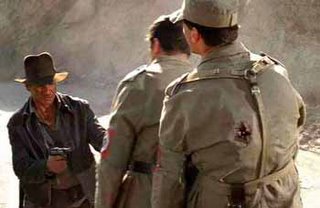ROLE-PLAYING: ANECDOTAL EVIDENCE




Anecdotal evidence is unreliable evidence based on personal observations and experiences (often recounted by way of anecdote) that has not been empirically tested, and which is often used in an argument as if it had been scientifically or statistically proven.
The person using anecdotal evidence may or may not be aware of the fact that, by doing so, they are generalizing.
For example, a politician might publicly demand better teacher training facilities because their own son or daughter happens to have a spectacularly incompetent teacher, or conversely, might insist that schools are in fine shape because their own son or daughter happens to have a singularly wonderful teacher.
Anecdotal evidence is not fallacious per se; its characterization as unreliable must be understood to mean unreliable with respect to the scientific method.
Many (perhaps most) true phenomena are first observed in the form of anecdotal evidence.
Stills from Indiana Jones and the Last Crusade (1989)


0 Comments:
Post a Comment
<< Home